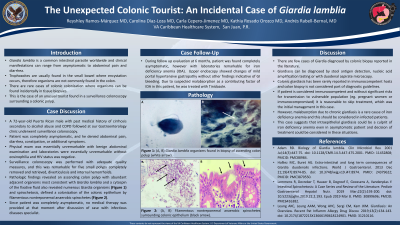Sunday Poster Session
Category: Colon
P0256 - The Unexpected Colonic Tourist: An Incidental Case of Giardia lamblia
Sunday, October 22, 2023
3:30 PM - 7:00 PM PT
Location: Exhibit Hall

Has Audio

Reyshley Ramos-Marquez, MD
VA Caribbean Healthcare System
San Juan, PR
Presenting Author(s)
Reyshley Ramos-Marquez, MD, Carolina Diaz-loza, MD, Carla M. Cepero-Jimenez, MD, Kathia Rosado-Orozco, MD, Andres Rabell-Bernal, MD
VA Caribbean Healthcare System, San Juan, Puerto Rico
Introduction: Giardia lamblia is the most common intestinal parasite worldwide and a cause of waterbone diarrhea. Clinical manifestations can range from asymptomatic to abdominal pain and diarrhea. Giardiasis can be diagnosed by stool antigen detection, nucleic acid amplification testing or with duodenal aspirate microscopy. Giardia lamblia trophozoites are usually found in the small bowel where encystation occurs, and therefore organisms are not commonly found in the colon or stools. However, there are rare cases of colonic colonization where organisms can be found incidentally in tissue biopsies. This is the case of an unusual tourist found in a surveillance colonoscopy surrounding a colonic polyp.
Case Description/Methods: A 72-year-old Puerto Rican male with past medical history of cirrhosis secondary to alcohol abuse and COPD followed at our Gastroenterology clinic underwent surveillance colonoscopy. Patient was completely asymptomatic and denied abdominal pain, diarrhea, constipation, or additional symptoms. Physical exam was essentially unremarkable with benign abdominal examination. Blood workup displayed stable Hgb and platelets level without eosinophilia. Liver chemisitries were only remarkable for mild elevation in AST. Coagulation parameters and albumin were within normal limits. HIV status was negative. Surveillance colonoscopy was performed with adequate quality measures, and this was remarkable for five small polyps completely removed and retrieved, diverticulosis and internal hemorrhoids. Pathologic findings revealed an ascending colon polyp with abundant adjacent organisms most consistent with Giardia lamblia and a cytospin of the fixative fluid also revealed numerous Giardia organisms. Since patient was completely asymptomatic, no medical therapy was provided after discussion of case with Infectious Disease section. The patient was subsequently evaluated, and he continued without additional symptoms or signs of malnutrition.
Discussion: Colonic giardiasis has been rarely reported in immunocompetent hosts and colon biopsy is not considered part of diagnostic guidelines. The decision of treatment in asymptomatic patients incidentally diagnosed with Giardiasis should be individualized. If patient is considered immunocompetent and without significant risks for transmission to vulnerable population (eg. pregnant women or immunocompromised) it is reasonable to skip treatment, which was the decision in this case.

Disclosures:
Reyshley Ramos-Marquez, MD, Carolina Diaz-loza, MD, Carla M. Cepero-Jimenez, MD, Kathia Rosado-Orozco, MD, Andres Rabell-Bernal, MD. P0256 - The Unexpected Colonic Tourist: An Incidental Case of Giardia lamblia, ACG 2023 Annual Scientific Meeting Abstracts. Vancouver, BC, Canada: American College of Gastroenterology.
VA Caribbean Healthcare System, San Juan, Puerto Rico
Introduction: Giardia lamblia is the most common intestinal parasite worldwide and a cause of waterbone diarrhea. Clinical manifestations can range from asymptomatic to abdominal pain and diarrhea. Giardiasis can be diagnosed by stool antigen detection, nucleic acid amplification testing or with duodenal aspirate microscopy. Giardia lamblia trophozoites are usually found in the small bowel where encystation occurs, and therefore organisms are not commonly found in the colon or stools. However, there are rare cases of colonic colonization where organisms can be found incidentally in tissue biopsies. This is the case of an unusual tourist found in a surveillance colonoscopy surrounding a colonic polyp.
Case Description/Methods: A 72-year-old Puerto Rican male with past medical history of cirrhosis secondary to alcohol abuse and COPD followed at our Gastroenterology clinic underwent surveillance colonoscopy. Patient was completely asymptomatic and denied abdominal pain, diarrhea, constipation, or additional symptoms. Physical exam was essentially unremarkable with benign abdominal examination. Blood workup displayed stable Hgb and platelets level without eosinophilia. Liver chemisitries were only remarkable for mild elevation in AST. Coagulation parameters and albumin were within normal limits. HIV status was negative. Surveillance colonoscopy was performed with adequate quality measures, and this was remarkable for five small polyps completely removed and retrieved, diverticulosis and internal hemorrhoids. Pathologic findings revealed an ascending colon polyp with abundant adjacent organisms most consistent with Giardia lamblia and a cytospin of the fixative fluid also revealed numerous Giardia organisms. Since patient was completely asymptomatic, no medical therapy was provided after discussion of case with Infectious Disease section. The patient was subsequently evaluated, and he continued without additional symptoms or signs of malnutrition.
Discussion: Colonic giardiasis has been rarely reported in immunocompetent hosts and colon biopsy is not considered part of diagnostic guidelines. The decision of treatment in asymptomatic patients incidentally diagnosed with Giardiasis should be individualized. If patient is considered immunocompetent and without significant risks for transmission to vulnerable population (eg. pregnant women or immunocompromised) it is reasonable to skip treatment, which was the decision in this case.

Figure: Figure 1: (A) Numerous Giardia organisms after cytospin of the fixative fluid (white arrow). (B & C) Giardia organisms found in biopsy of ascending colon polyp.
Disclosures:
Reyshley Ramos-Marquez indicated no relevant financial relationships.
Carolina Diaz-loza indicated no relevant financial relationships.
Carla Cepero-Jimenez indicated no relevant financial relationships.
Kathia Rosado-Orozco indicated no relevant financial relationships.
Andres Rabell-Bernal indicated no relevant financial relationships.
Reyshley Ramos-Marquez, MD, Carolina Diaz-loza, MD, Carla M. Cepero-Jimenez, MD, Kathia Rosado-Orozco, MD, Andres Rabell-Bernal, MD. P0256 - The Unexpected Colonic Tourist: An Incidental Case of Giardia lamblia, ACG 2023 Annual Scientific Meeting Abstracts. Vancouver, BC, Canada: American College of Gastroenterology.
